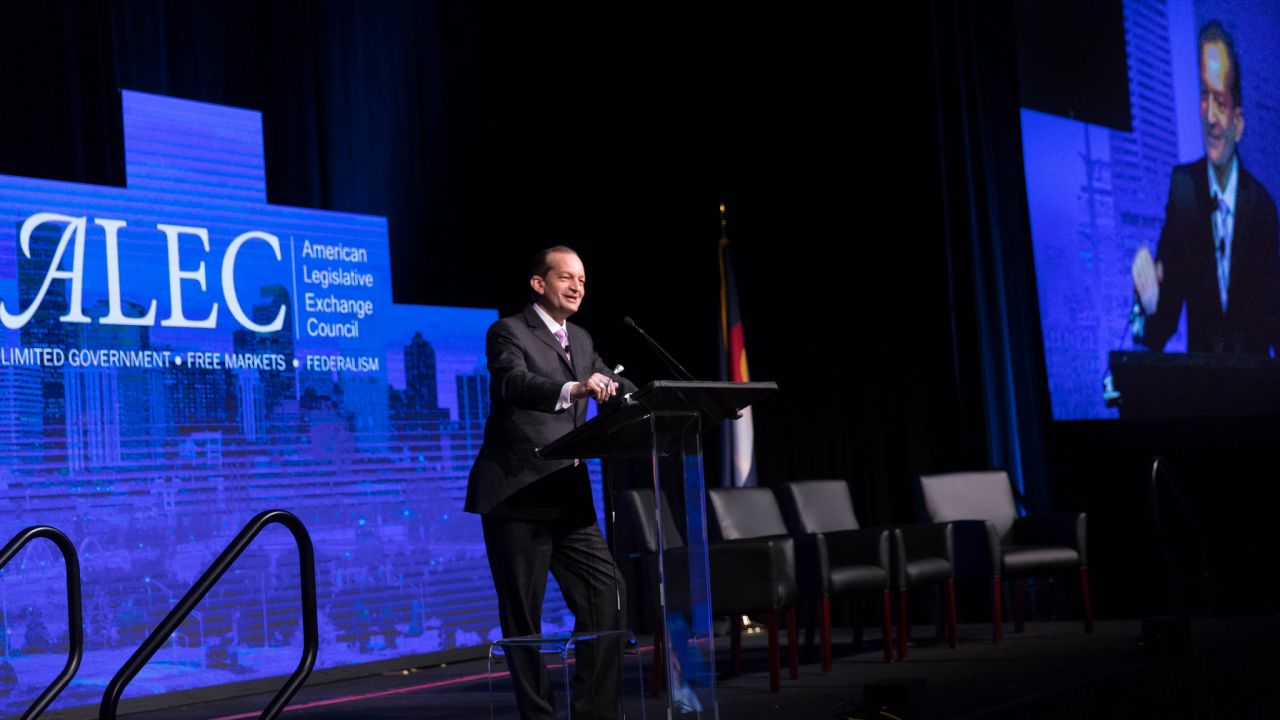
US Secretary of Labor Alexander Acosta delivers remarks and participates in Q&A at the 44th annual American Legislative Exchange Council (ALEC) meeting in Denver on July 1, 2017. (Photo by US Department of Labor | Flickr CC 2.0)
This post originally appeared at PR Watch.
The American Legislative Exchange Council (ALEC) has earned a reputation as a leading corporate influence group in recent years, with corporate lobbyists and legislators voting as equals in secret on scores of corporate bills to deregulate everything from the power and telecom industries to drug prices and health care.
Well, it’s no wonder. New research by the Center for Media and Democracy (CMD) shows that the pay-to-play lobby group’s biggest corporate funders are also among the nation’s biggest violators of the health, safety, consumer, worker and environmental protection laws ALEC seeks to dismantle.
Just 38 of ALEC’s for-profit corporate members have paid out a total of $16 billion in federal fines and penalties since 2000.
The calculation was made using Violation Tracker, a database of all federal regulatory violations compiled by Good Jobs First.
CMD’s analysis focuses on larger ALEC companies that have paid at least $10 million in federal fines and penalties between 2000 and 2017. On average, those companies each owed a total of $421 million over those years for violating laws managed by the Environmental Protection Agency, Department of Justice, Equal Employment Opportunity Commission, Occupational Health and Safety Administration and other enforcement agencies.
ALEC’s top violators racked up on average nearly triple in fines and penalties than similar US companies. By comparison, the non-financial corporations operating in the US in the Violation Tracker database with over $10 million in fines/violations paid out an average total of $146 million over the same period.
Fourteen of ALEC’s corporate leaders are in the top 100 of all non-financial violators in the US. Altogether, there are some 200,000 companies in the database.
The worst ALEC offenders by industry were pharmaceutical, energy, utility, railroad and telecom/cable companies. Those companies are also heavily represented among the leaders and principal funders of ALEC.
ALEC’s Top 10 Violators List
| Rank | Company | Fines Paid |
| 1. | Pfizer | $4.350 billion |
| 2. | TEVA Pharmaceuticals | $1.757 billion |
| 3. | Eli Lilly | $1.482 billion |
| 4. | Dominion Energy | $1.250 billion |
| 5. | Novartis | $939 million |
| 6. | Takeda Pharmaceuticals | $875 million |
| 7. | ExxonMobil | $715 million |
| 8. | Koch Industries | $657 million |
| 9. | Chevron | $578 million |
| 10. | AT&T | $431 million |
ALEC’s top 10 violators account for more than 80 percent ($13 billion) of the federal fines and penalties for all major ALEC lawbreakers.
Exxon provides a prime example of why repeat violators ally themselves with groups like ALEC in order to weaken regulations and influence public policy.
Exxon pumped more than $1.7 million into ALEC over a 17-year period as part of a written industry plan to use ALEC to sow uncertainty about climate science and undermine international climate treaties, as CMD detailed in a complaint to the IRS last fall. It used ALEC to promote Exxon’s legislative goals around cap-and-trade policies, fracking, the Keystone Pipeline and opposition to the Obama Administration’s Clean Power Plan, as CMD noted in its letter to the Senate regarding Rex Tillerson’s nomination.
Of the Top 10, Pfizer and Koch current have top representatives currently serving on ALEC’s corporate board (now called the Private Enterprise Advisory Council); Takeda Pharmaceuticals chairs its Health and Human Services Task Force; and Exxon-Mobil served on ALEC’s corporate board from 2007-16.
Virtually all of the 38 big violators currently have or have had seats on ALEC’s task forces, which allow them to vote for their custom-made bills alongside legislators who take back home to their statehouses, as well as to veto any “model” bills or amendments they don’t like, without the press or public present.
Arn Pearson contributed to this story.




